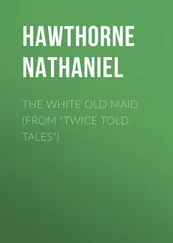Here the stranger seemed to be so much amused with his sketch of Hollingsworth’s character and purposes, that he burst into a fit of merriment, of the same nature as the brief, metallic laugh already alluded to, but immensely prolonged and enlarged. In the excess of his delight, he opened his mouth wide, and disclosed a gold band around the upper part of his teeth, thereby making it apparent that every one of his brilliant grinders and incisors was a sham. This discovery affected me very oddly.
I felt as if the whole man were a moral and physical humbug; his wonderful beauty of face, for aught I knew, might be removable like a mask; and, tall and comely as his figure looked, he was perhaps but a wizened little elf, gray and decrepit, with nothing genuine about him save the wicked expression of his grin. The fantasy of his spectral character so wrought upon me, together with the contagion of his strange mirth on my sympathies, that I soon began to laugh as loudly as himself.
By and by, he paused all at once; so suddenly, indeed, that my own cachinnation lasted a moment longer.
“Ah, excuse me!” said he. “Our interview seems to proceed more merrily than it began.”
“It ends here,” answered I. “And I take shame to myself that my folly has lost me the right of resenting your ridicule of a friend.”
“Pray allow me,” said the stranger, approaching a step nearer, and laying his gloved hand on my sleeve. “One other favor I must ask of you. You have a young person here at Blithedale, of whom I have heard, — whom, perhaps, I have known, — and in whom, at all events, I take a peculiar interest. She is one of those delicate, nervous young creatures, not uncommon in New England, and whom I suppose to have become what we find them by the gradual refining away of the physical system among your women. Some philosophers choose to glorify this habit of body by terming it spiritual; but, in my opinion, it is rather the effect of unwholesome food, bad air, lack of outdoor exercise, and neglect of bathing, on the part of these damsels and their female progenitors, all resulting in a kind of hereditary dyspepsia. Zenobia, even with her uncomfortable surplus of vitality, is far the better model of womanhood. But — to revert again to this young person — she goes among you by the name of Priscilla. Could you possibly afford me the means of speaking with her?”
“You have made so many inquiries of me,” I observed, “that I may at least trouble you with one. What is your name?”
He offered me a card, with “Professor Westervelt” engraved on it. At the same time, as if to vindicate his claim to the professorial dignity, so often assumed on very questionable grounds, he put on a pair of spectacles, which so altered the character of his face that I hardly knew him again. But I liked the present aspect no better than the former one.
“I must decline any further connection with your affairs,” said I, drawing back. “I have told you where to find Zenobia. As for Priscilla, she has closer friends than myself, through whom, if they see fit, you can gain access to her.”
“In that case,” returned the Professor, ceremoniously raising his hat, “good-morning to you.”
He took his departure, and was soon out of sight among the windings of the woodpath. But after a little reflection, I could not help regretting that I had so peremptorily broken off the interview, while the stranger seemed inclined to continue it. His evident knowledge of matters affecting my three friends might have led to disclosures or inferences that would perhaps have been serviceable. I was particularly struck with the fact that, ever since the appearance of Priscilla, it had been the tendency of events to suggest and establish a connection between Zenobia and her. She had come, in the first instance, as if with the sole purpose of claiming Zenobia’s protection. Old Moodie’s visit, it appeared, was chiefly to ascertain whether this object had been accomplished. And here, to-day, was the questionable Professor, linking one with the other in his inquiries, and seeking communication with both.
Meanwhile, my inclination for a ramble having been balked, I lingered in the vicinity of the farm, with perhaps a vague idea that some new event would grow out of Westervelt’s proposed interview with Zenobia. My own part in these transactions was singularly subordinate. It resembled that of the Chorus in a classic play, which seems to be set aloof from the possibility of personal concernment, and bestows the whole measure of its hope or fear, its exultation or sorrow, on the fortunes of others, between whom and itself this sympathy is the only bond. Destiny, it may be, — the most skilful of stage managers, — seldom chooses to arrange its scenes, and carry forward its drama, without securing the presence of at least one calm observer. It is his office to give applause when due, and sometimes an inevitable tear, to detect the final fitness of incident to character, and distil in his long-brooding thought the whole morality of the performance.
Not to be out of the way in case there were need of me in my vocation, and, at the same time, to avoid thrusting myself where neither destiny nor mortals might desire my presence, I remained pretty near the verge of the woodlands. My position was off the track of Zenobia’s customary walk, yet not so remote but that a recognized occasion might speedily have brought me thither.
XII. COVERDALE’S HERMITAGE
Table of Contents
Long since, in this part of our circumjacent wood, I had found out for myself a little hermitage. It was a kind of leafy cave, high upward into the air, among the midmost branches of a white-pine tree. A wild grapevine, of unusual size and luxuriance, had twined and twisted itself up into the tree, and, after wreathing the entanglement of its tendrils around almost every bough, had caught hold of three or four neighboring trees, and married the whole clump with a perfectly inextricable knot of polygamy. Once, while sheltering myself from a summer shower, the fancy had taken me to clamber up into this seemingly impervious mass of foliage. The branches yielded me a passage, and closed again beneath, as if only a squirrel or a bird had passed. Far aloft, around the stem of the central pine, behold a perfect nest for Robinson Crusoe or King Charles! A hollow chamber of rare seclusion had been formed by the decay of some of the pine branches, which the vine had lovingly strangled with its embrace, burying them from the light of day in an aerial sepulchre of its own leaves. It cost me but little ingenuity to enlarge the interior, and open loopholes through the verdant walls. Had it ever been my fortune to spend a honeymoon, I should have thought seriously of inviting my bride up thither, where our next neighbors would have been two orioles in another part of the clump.
It was an admirable place to make verses, tuning the rhythm to the breezy symphony that so often stirred among the vine leaves; or to meditate an essay for “The Dial,” in which the many tongues of Nature whispered mysteries, and seemed to ask only a little stronger puff of wind to speak out the solution of its riddle. Being so pervious to air-currents, it was just the nook, too, for the enjoyment of a cigar. This hermitage was my one exclusive possession while I counted myself a brother of the socialists. It symbolized my individuality, and aided me in keeping it inviolate. None ever found me out in it, except, once, a squirrel. I brought thither no guest, because, after Hollingsworth failed me, there was no longer the man alive with whom I could think of sharing all. So there I used to sit, owllike, yet not without liberal and hospitable thoughts. I counted the innumerable clusters of my vine, and fore-reckoned the abundance of my vintage. It gladdened me to anticipate the surprise of the Community, when, like an allegorical figure of rich October, I should make my appearance, with shoulders bent beneath the burden of ripe grapes, and some of the crushed ones crimsoning my brow as with a bloodstain.
Читать дальше












